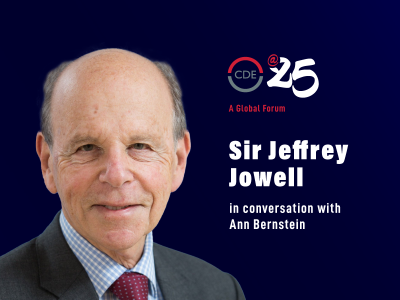Sir Jeffrey Jowell in conversation with Ann Bernstein

- Sir Jeffrey Jowell, Emeritus Professor of Public Law at University College London, former founding Director of the Bingham Centre for the Rule of Law, and practising barrister at Blackstone Chambers in London, spoke to CDE’s executive director Ann Bernstein about the importance of the rule of law.
- Sir Jeffrey argued that there are four elements comprising the rule of law: legality i.e. laws that apply to everyone which means that officials cannot be permitted to act in arbitrary or illegal ways; certainty, ie laws which cannot be applied retrospectively or arbitrarily; equality, ie laws should apply equally to everyone – rich or poor, powerful or marginalized, and be applied with equal respect and human dignity for all; accessible, i.e. people can challenge decisions that affect their lives and are entitled to a fair trial before independent judges.
- Addressing the importance of the rule of law in the wake of widespread looting and unrest in South Africa, Judge Johann Kriegler said, “the rule of law is critically important at the present moment, when we are facing the gravest threat our democracy has had to confront since we emerged from darkness two decades ago.”
- Reflecting on our Constitution – to which he contributed – Sir Jeffrey said: “Nelson Mandela, to his eternal credit, decided that South Africa should write an original constitution that tackles our circumstances and says we will never again return to what we had before. As a result, it is probably the most original constitution in existence.”
- Sir Jeffrey argued that judges face more stringent forms of accountability than any other decision-maker in our society: “In what other area of public decision-making does the decision-maker give you sometimes 150 pages of reasons justifying their decision? ….Legal cases normally require independent legal professionals to argue the case, on each side, in open court, where everything can be seen and monitored. When the judgments come out, they are published, allowing academics and others to pour over them and criticise them openly. Lastly, in many instances, cases from the lower courts can be appealed to higher courts. If you add that up, you have a very deep form of judicial accountability.”
- He explained that the rule of law is built very powerfully into our Constitution in that it enables individuals to challenge the government. The government is required to act in a way that is legal, procedurally fair, and reasonable, giving reasons for its decisions and enabling access to information. This idea has since found its way into other constitutions throughout the world and even the Charter of Rights of the European Union.
- Jowell believes that there are too many politicians on the Judicial Services Commission. He contends that “If you want to be truly independent, providing impartial umpires without any political taint, the political input should be reduced.”
- He argued that the rule of law and ease of doing business are closely linked. “It makes sense that countries that respect legal certainty, equality, legality, and judicial independence are going to make it easy to do business and are seen as destinations for investment and places where reliable international partners can thrive.”







